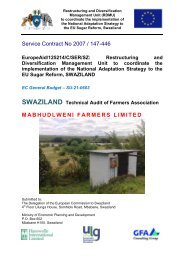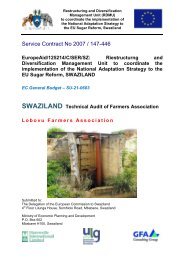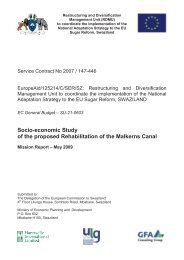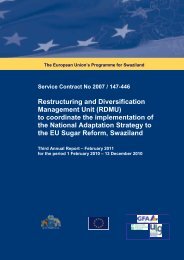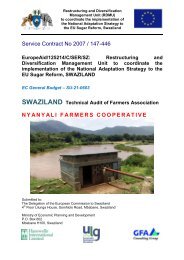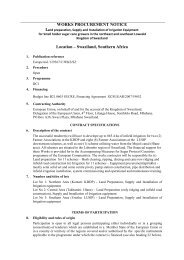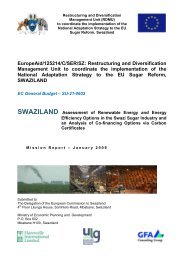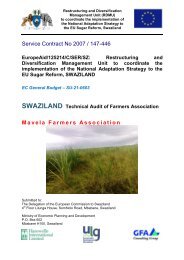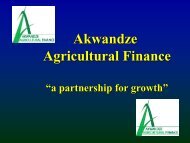Service Contract No 2007 / 147-446 Strategic ... - Swaziland
Service Contract No 2007 / 147-446 Strategic ... - Swaziland
Service Contract No 2007 / 147-446 Strategic ... - Swaziland
- No tags were found...
Create successful ePaper yourself
Turn your PDF publications into a flip-book with our unique Google optimized e-Paper software.
5.3.4 Options to address the key aspectDifferent options are available to address the impacts affecting the vulnerability, and hencesustainability, of the small- and medium-cane growers, with some issues being investigated,if not addressed, by the sugar industry. Based on this study it is recommended that emphasisbe given to an evaluation of the management models for small cane growers currentlypromoted by developers (e.g. SWADE). As stated above, this is regarded as the basic coreissue to potential high levels of risk.An evaluation would comprise a SWOT analysis of current models, and comparing themodels with other options (such as co-operatives). Particular consideration need to be givento outsourcing the management of the FAs, employing an outside private company tomanage all the FAs in one development, such as in LUSIP and KDDP, and thus taking directmanagement responsibility away from the farmers themselves. Already this happens, tosome degree, where the Millers ‘manage’ outgrowers.The evaluation process would involve intense public participation at all levels, andparticularly with the farmers themselves. It would require a supplementary educationprocess, to ensure that the different options are presented before informed decisions aremade.Once there is agreement on an acceptable and workable management system, activitiescould then be directed towards strengthening the operation of the small cane growers, suchas through infrastructure development (including local road networks), extension serviceprovision, training in irrigation agriculture, assistance with HIV/AIDS-related concerns; andsecuring land tenure.Within the current situation, if there is no change to the management model, the main focuswould be towards the capacity building and training of farmers, particularly in skills relating tomanaging farms, individually and as part of a FA. Concern around the lack of managementskills was raised continuously, by emerging farmers, farmers already in FAs, and otherbodies consulted.In any event, although it is recognised that training programmes are in place, they seem tobe offered by numerous organisations (the MOA, SHIP, the SSA, SWADE and Millers, forexample), provided ad hoc with little coordination. One body need be designated the task ofmanaging training across-the-board, ensuring that the training offered is appropriate to therequirements of farmers, is of a high level, is standardised across the country, and is beingimplemented, reaching all those in need.Co-ordination will be the primary task of such an organisation. Other responsibilities willinclude: a review of the training/support needs of FAs through a needs assessment; settingup a database of existing and potential training organisations, who will need to register andqualify as trainers; developing criteria to standardise the training programmes offered;disseminating information on what training is being provided, by whom and when; andmonitoring and evaluating the content and implementation of the process.Other issues are regarded as relevant, requiring consideration. In order to address concernsaround a ‘safety net”, an option of high priority is ensuring social safeguards against potentialfailure of sugar cane farming through allocating portions of land to alternative crops andlivestock farming.Studies have been conducted into the possible diversification of farming into cash cropsother than sugar, and consideration around this is ongoing. However, for those farmers withsugar cane as their primary cash crop, on a farm level there is a need to allocate portions ofland to grow subsistence crops and to keep livestock. It seems that the allocation of land forfood is being considered, and in some cases implemented, by LUSIP and KDDP. Having thisRDMU (<strong>Strategic</strong> Environmental Assessment of the National Adaptation Strategy) - Page 64



